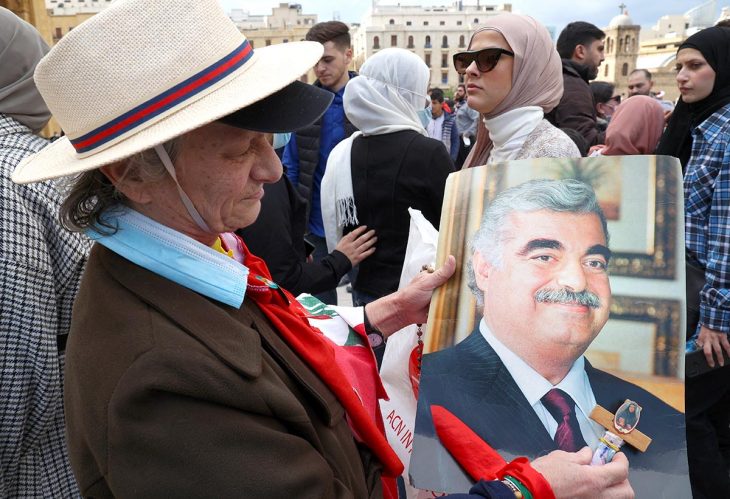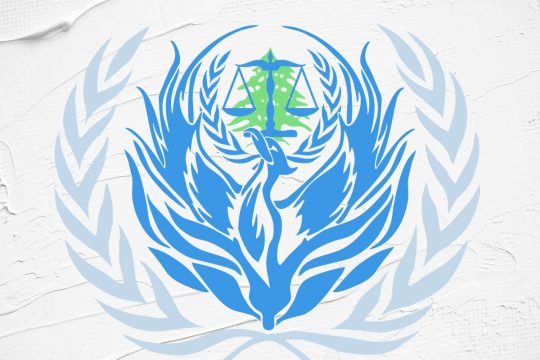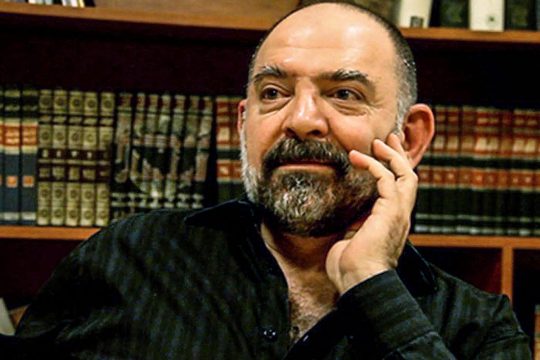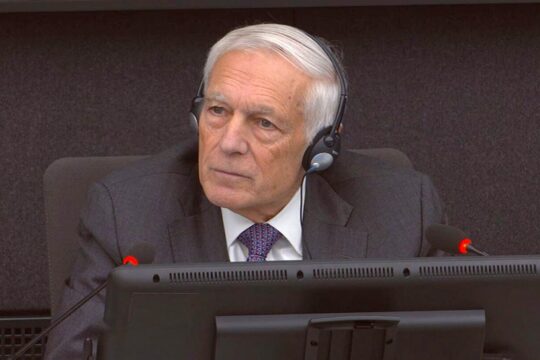Hassan Habib Merhi and Hussein Hassan Oneissi were acquitted in August 2020. Both men had been tried by the Special Tribunal for Lebanon (STL) on charges of terrorism and murder for their alleged role in the 2005 assassination by bombing of former Lebanese prime minister Rafik al-Hariri. The trial – in absentia – was the result of fifteen years of investigations. The prosecution had appealed, saying that the Trial Chamber had "erred" by ruling there was not enough evidence. On March 10, the appeals judges agreed that the Trial Chamber wrongly assessed the circumstantial evidence in the case, which was based almost entirely on mobile phone records, when they acquitted Merhi and Oneissi. They said the trial judges had "committed errors of law invalidating the judgment and errors of fact occasioning a miscarriage of justice", according to a statement from the STL. Instead the appeals judges found them guilty of being accomplices to the bombing of Hariri’s convoy.
The initial Trial Chamber judgment was long and full of historical and forensic detail. Around 300 witnesses had been heard during the trial and 170,000 pages of evidence submitted over the fifteen years since the first international investigators into Hariri’s murder were sent to Lebanon. The appeals judgement is similarly weighty. “The Appeals Judgement contributes to the historical record as the factual narrative of what transpired,” says STL Prosecutor Normal Farrell in an interview by email with Justice Info. “Uncovering the facts as to what happened that mid-day on 14 February 2005, can be seen as a form of justice. It is the basis to counter false factual narratives or historical revisionism. It is, in part, a remedy. But not a complete remedy, and not complete justice. An in absentia conviction is only, essentially, second best justice. Complete justice requires that the convicted persons, who have evaded justice, be arrested.”
Trials in absentia
On 14 February 2005, Hariri, a billionaire businessman who had been Lebanon’s Prime Minister from 1992 to 1998 and again from 2000 to 2004, was travelling in a motorcade in downtown Beirut when a bomb hidden in a van exploded, killing him and 21 other people. He had supported calls for Syria, the backer of Lebanese powerful militant political movement Hezbollah, to withdraw its forces from Lebanon. After collecting evidence, the UN and Lebanon jointly set up the Netherlands-based STL in 2007 to investigate the bombing.
Five Hezbollah operatives were indicted by the STL in 2011 and 2013 and put on trial - Mustafa Amine Badreddine, Salim Jamil Ayyash, Hassan Habib Merhi, Hussein Hassan Oneissi and Assad Hassan Sabra. Ayyash was accused of co-ordinating the physical perpetration of the attack. Together with Badreddine he allegedly watched Hariri. The three others had more minor roles.
Hezbollah has denied any involvement in the assassination. Badreddine, a higher level Hezbollah military commander, was reportedly killed in Syria in 2016. The four other accused were all tried in absentia and remain at large. In 2020, Ayyash was found guilty and sentenced to life imprisonment. The other three were acquitted. The trial judges concluded that no evidence implicated Hezbollah's leadership.
The prosecution filed appeals against the acquittals of Merhi and Oneissi, not against Sabra. Ayyash’s defence team tried to appeal his conviction. But the Appeals Chamber said there was no mechanism for the defence to challenge that verdict - the STL legal framework “does not contemplate a Defence appeal in absentia,” it said.
The reversal
The STL was costing around 2.8 million euros per month – for a total of about 1 billion dollars since the opening of an international investigation in 2015 – and was gearing up to start a second trial against the same defendant, Ayyash, again in absentia. In June 2021 it ran out of cash, meaning it would have to close by the end of July due to lack of funds. Donors coughed up enough to cover only the appeals judgment – about 7 million euros for 2022.
The prosecution's case had mainly relied on the analysis of calls between different sets of mobile phones that it said were used to plan, prepare and execute the attack. It had argued that after the attack Merhi and Oneissi participated in the distribution of a video-taped false claim of responsibility. The Appeals Chamber concluded that a network of phones, labelled by the Prosecution as the “Green Network”, was used to coordinate the attack and that Merhi and Ayyash were members of the Green Network. It unanimously reversed Merhi and Oneissi's acquittals and found them guilty of five counts of conspiracy aimed at committing a terrorist act, being an accomplice to committing a terrorist act, to intentional homicide, and to attempted intentional homicide. Judges said that shortly after the attack, Merhi and Oneissi did participate in the distribution of the video and ensured that it would be collected and broadcast on Al-Jazeera television within hours of the attack. “The Appeals Judgement corrected the facts, including the involvement of Mustapha Amin Badreddine, a Hezbollah military commander, as a member of the network that coordinated the attack and the role of those who attempted to present a false claim of responsibility,” says Farrell.
The next step is sentencing in absentia. “With the delivery of the sentence the Tribunal expects all judicial proceedings related to the main case will be concluded by July 2022,” says Wajed Ramadan, spokesperson of the Tribunal. Previously the registrar said they would be heading towards a “dormant entity”.
“After their acquittal, arrest warrants against Merhi and Oneissi were cancelled,” explains Ramadan. “Following their conviction new local and international arrest warrants were issued on Thursday. The local arrests are sent to the Lebanese authorities. The Appeals Chamber also authorised the Prosecution to request Interpol to issue notices.” The two men’s whereabouts are not known. “Efforts have to continue to arrest the three persons convicted,” says Farrell.
Syria’s involvement still on the table
Even though the tribunal was costly and took many years, Farrell claims “a number of elements of success” for the prosecution. “First, the accused were convicted on the basis of complicated, technical telecommunications evidence. A conviction based extensively on technical data is historical in terms of international justice. Second, the investigation with the assistance of the Lebanese uncovered not only the network of individuals who carried out the assassination on 14 February 2005, but other covert networks used in the surveillance of the former Prime Minister over months. There was no contact or communication between the different cells or networks that worked together to effect that attack. Uncovering the various interconnected networks and their coordination allowed the court, and the Lebanese people to understand how it was possible that Rafik Hariri could be assassinated in broad daylight in downtown Beirut. Third, the conviction, based on facts accepted by the Appeals Chamber, was in accordance with the highest standards of international justice. The accused, though absent, were given their full rights of defence, were defended by Counsel and were convicted based on the required standard of proof beyond a reasonable doubt.” Farrell notes that the indictment against Ayyash for his alleged involvement in a second case concerning three other attacks stands even though the STL closes.
Others are less sanguine. It was “good for the judges to justify the additional months of pay – at least the appeal has worked at the end,” says Nidal Jurdi, who had been representing victims in the second, connected case.
Robert Roth, professor of law at the University of Geneva and former judge at the STL resigned many years ago expressing a harsh critique of political interference in its work. He now says: “Legitimacy does not rely on convictions. The real challenges to the legitimacy of the STL are still open: does it make sense to adjudicate seventeen years after the event? Have the real responsible been prosecuted? The suspicion of Syrian involvement, on which the Trial Chamber has expressed itself briefly but with strong words, is still on the table and will probably never be addressed.”
The appeals chamber judgment does not add to those earlier conclusions that there were “organising hands” behind the attack and that “Syria and Hezbollah may have had motives to eliminate Mr Hariri”. The tribunal closes with no definitive finding.








